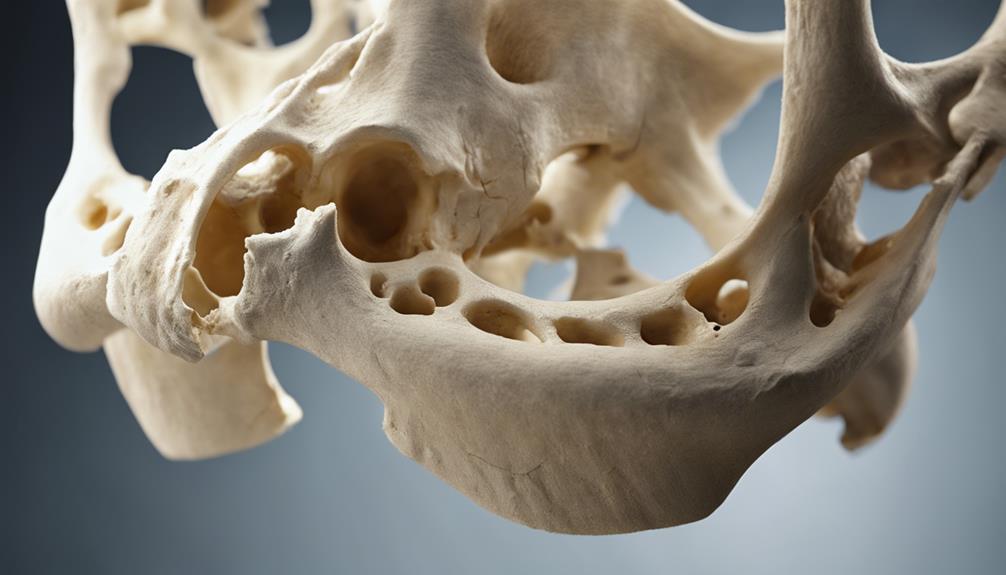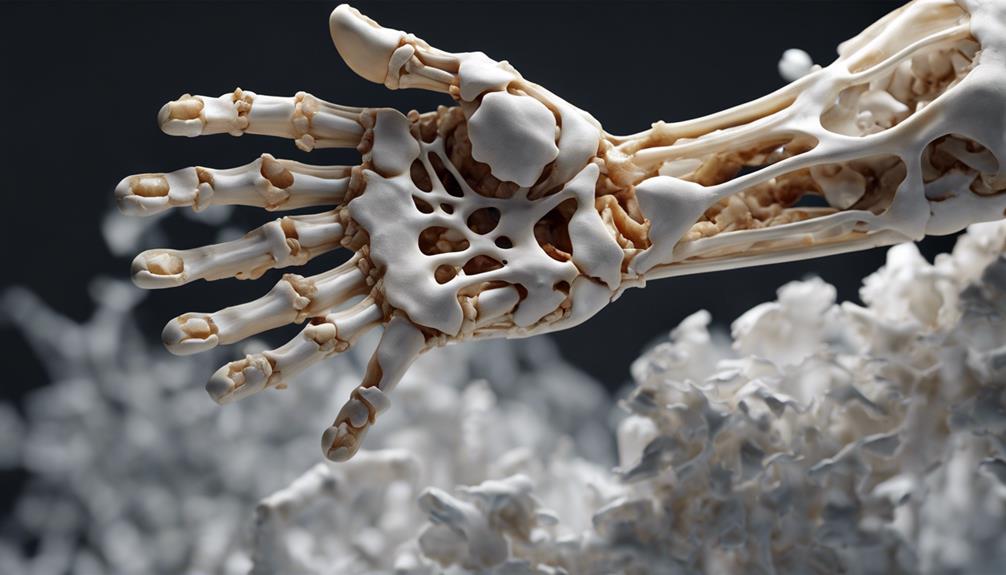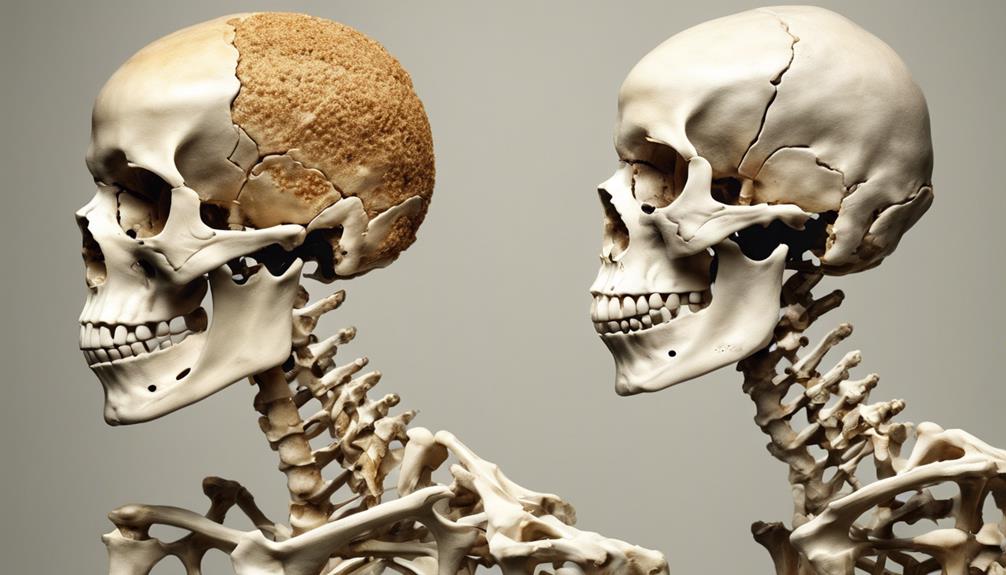Approximately 54 million Americans aged 50 and older are affected by osteoporosis or low bone density. This striking statistic underscores the significance of recognizing the role of an osteoporosis specialist in addressing this condition.
From bone health assessments to tailored care plans, these specialists are equipped to address the complexities of osteoporosis and improve patients' overall quality of life.
But what specific strategies do they employ, and how do they collaborate with other healthcare providers to ensure optimal outcomes?
Key Takeaways
- Specializes in bone health diagnosis and treatment.
- Utilizes BMD scans and prescribes bisphosphonates.
- Emphasizes lifestyle changes for bone health.
- Focuses on prevention, early detection, and personalized care.
Role of an Osteoporosis Doctor
As osteoporosis doctors, our primary role is to specialize in diagnosing and treating bone health conditions, particularly osteoporosis. One essential aspect of our work involves conducting bone density tests to assess the strength and health of our patients' bones. These tests help us evaluate the mineral content and density of the bones, providing crucial information about the risk of fractures and the overall bone health status.
Through bone density tests, we can identify individuals who may be at a higher risk of developing osteoporosis or experiencing fractures. By analyzing the results of these tests, we can tailor personalized treatment plans that may include lifestyle modifications, medications, and preventive measures to improve bone health and reduce fracture risk.
Regular monitoring through bone density tests allows us to track changes in bone density over time, assess the effectiveness of treatment plans, and make necessary adjustments to ensure optimal bone health. Our commitment to conducting thorough bone density evaluations underscores our dedication to enhancing the quality of life for our patients by promoting strong and healthy bones.
Importance of Bone Health Assessment

Conducting regular bone health assessments is a crucial step in identifying and preventing osteoporosis-related fractures. Assessing bone density through tests like DEXA scans provides valuable insights into bone health and helps in diagnosing osteoporosis early. Here are three key reasons why bone health assessments are essential:
- Early Detection: Bone health assessments allow for the early detection of low bone density, enabling timely intervention and treatment to prevent osteoporosis-related complications.
- Risk Evaluation: Regular assessments are particularly important for individuals at higher risk of developing osteoporosis, such as postmenopausal women and older adults, as they help in evaluating the risk of fractures.
- Treatment Monitoring: Monitoring bone health through assessments plays a pivotal role in assessing the effectiveness of osteoporosis treatments and interventions, guiding healthcare providers in adjusting treatment plans as needed.
Diagnostic Tests for Osteoporosis
When evaluating osteoporosis, physicians rely on diagnostic tests like bone mineral density (BMD) scans to assess bone density and strength. These tests, such as dual-energy X-ray absorptiometry (DEXA), are essential in determining the risk of fractures by evaluating the quality of bones. BMD tests are painless and non-invasive, providing valuable insights into overall bone health. The results obtained from these tests play a crucial role in diagnosing osteoporosis accurately and formulating appropriate treatment plans tailored to the individual's needs.
Regular monitoring through BMD tests enables healthcare providers to track changes in bone density over time, allowing for adjustments in osteoporosis management strategies when necessary. By utilizing these diagnostic tools, doctors can offer personalized care and interventions to enhance bone health and reduce the risk of fractures associated with osteoporosis. It's through these comprehensive assessments that individuals can take proactive steps towards maintaining strong and healthy bones.
Medications for Bone Density
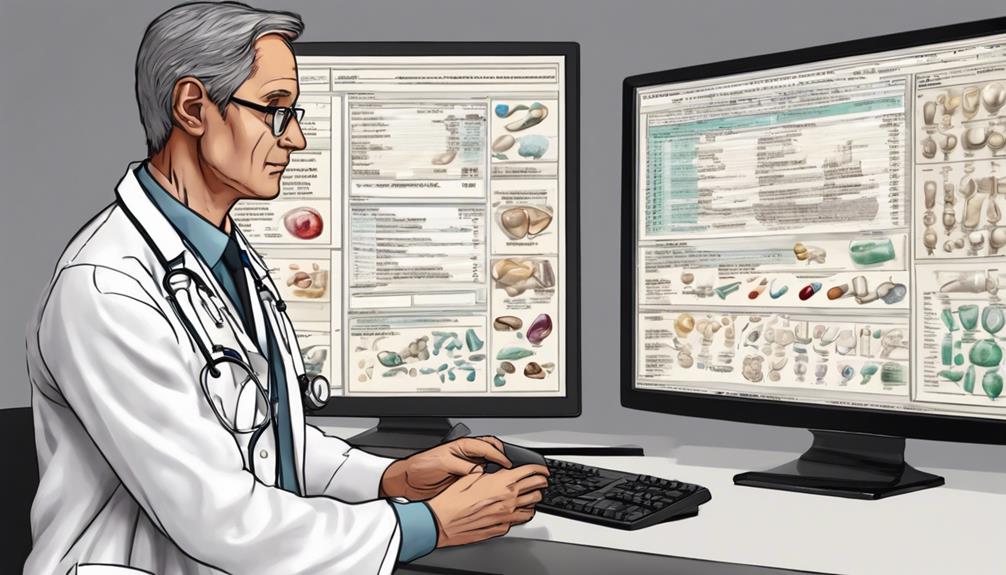
When it comes to medications for improving bone density, we've several options to consider. Bisphosphonates like alendronate and risedronate are commonly prescribed to help strengthen bones.
It's important to discuss potential side effects and benefits with your healthcare provider when deciding on the best course of action.
Common Medications Overview
Common medications for osteoporosis, including bisphosphonates like alendronate and risedronate, play a crucial role in preventing bone loss and maintaining bone density. These medications are vital in preserving skeletal health and reducing the risk of fractures.
Here is an overview of common medications for improving bone density:
- Bisphosphonates: Alendronate and risedronate are commonly prescribed to prevent bone loss by inhibiting osteoclast activity.
- Calcitonin: This hormone helps regulate calcium levels and can strengthen bones in individuals with osteoporosis.
- Selective Estrogen Receptor Modulators (SERMs): Raloxifene falls under this category and can enhance bone density while decreasing the likelihood of fractures.
Understanding these medications can empower individuals to make informed decisions about their bone health.
Side Effects Consideration
Considering the potential side effects of medications for bone density is crucial for comprehensive osteoporosis treatment and management. Some common side effects of these medications include gastrointestinal issues like stomach upset, heartburn, or constipation. Muscle, joint, or bone pain can also occur as a side effect of certain osteoporosis treatments.
Rare but severe side effects such as osteonecrosis of the jaw or atypical femur fractures have been reported with medications like bisphosphonates. Injectable osteoporosis medications may lead to injection site reactions such as redness, swelling, or pain. It's essential to have open discussions with your healthcare provider about the potential side effects of bone density medications to ensure effective monitoring and management throughout your treatment journey.
Lifestyle Modifications for Bone Health

We understand the importance of lifestyle modifications in promoting optimal bone health. Regular weight-bearing exercises like walking and strength training can enhance bone density and strength. A diet rich in calcium and vitamin D is crucial for preventing osteoporosis.
Avoiding smoking and excessive alcohol consumption are also key factors in maintaining healthy and strong bones.
Diet for Bone Health
For optimal bone health and to reduce the risk of osteoporosis, ensuring your diet is rich in calcium and vitamin D is crucial. To support your bones, consider the following:
- Incorporate Calcium-Rich Foods: Dairy products, leafy greens, nuts, and fortified foods are excellent sources of calcium.
- Prioritize Vitamin D: Vitamin D aids in calcium absorption and bone mineralization.
- Maintain a Balanced Diet: A well-rounded diet rich in essential nutrients is key to supporting bone density and overall bone health.
Ensuring that your diet includes these bone-boosting elements can help fortify your bones and reduce the risk of osteoporosis. Remember to limit intake of soda, caffeine, and alcohol for even better bone health.
Exercise Benefits Bones
To enhance bone strength and decrease the risk of osteoporosis, incorporating weight-bearing exercises like walking, dancing, and jogging into your routine is crucial. These activities help improve bone density and reduce the likelihood of fractures. Additionally, resistance training with weights or resistance bands can further enhance bone density and muscle strength. Balance exercises like yoga and tai chi are essential for preventing falls, especially for individuals with osteoporosis. Regular physical activity not only benefits bone health but also promotes cardiovascular health, flexibility, and overall well-being. When combined with a balanced diet rich in calcium and vitamin D, exercise plays a vital role in maintaining strong and healthy bones throughout life.
| Exercise Type | Benefits |
|---|---|
| Weight-Bearing Activities | Strengthen bones and reduce osteoporosis |
| Resistance Training | Improve bone density and muscle strength |
| Balance Exercises | Prevent falls and fractures |
Dietary Recommendations for Strong Bones

Ensuring a sufficient intake of calcium and vitamin D through your daily diet is crucial for maintaining strong bones and reducing the risk of osteoporosis. To support your bone density, consider the following dietary recommendations:
- Calcium-rich Foods: Incorporate dairy products like milk, yogurt, and cheese, as well as leafy green vegetables such as kale and broccoli, almonds, and fortified products like orange juice into your meals.
- Vitamin D Sources: Include fatty fish like salmon and mackerel, egg yolks, and seek sunlight exposure to help your body absorb calcium efficiently.
- Balanced Diet: Opt for a variety of nutrient-rich foods to ensure you're getting essential vitamins and minerals for overall bone health. A well-rounded diet contributes to preventing osteoporosis and maintaining bone density as you age.
Exercise Regimen for Osteoporosis
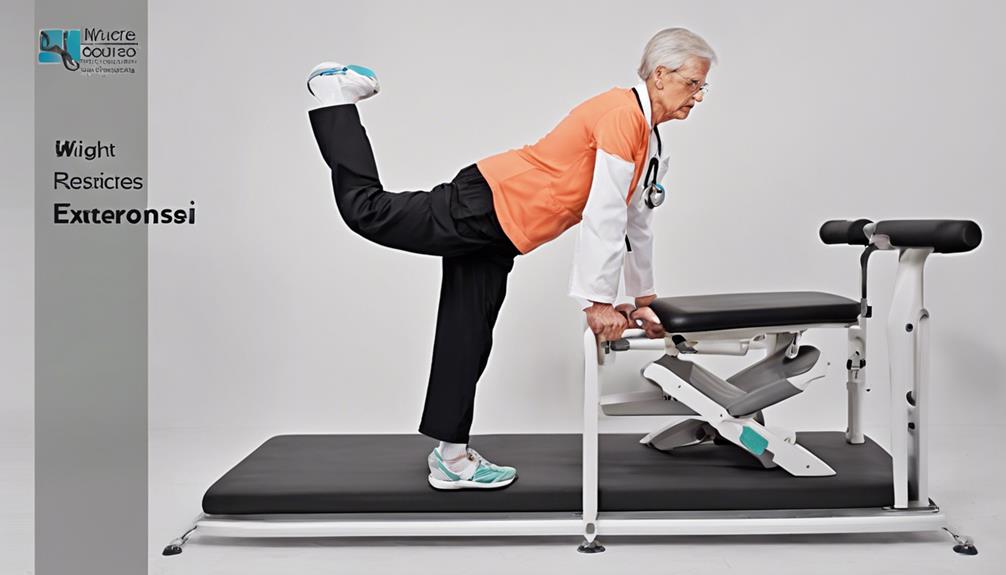
To effectively manage osteoporosis and maintain strong bones, incorporating a well-rounded exercise regimen is essential for promoting bone health and reducing the risk of fractures. Weight-bearing exercises such as walking, jogging, and dancing are particularly beneficial for increasing bone density and strength in individuals with osteoporosis. These activities help to stimulate bone growth and reduce the likelihood of fractures.
Additionally, incorporating resistance training with weights or resistance bands into your routine can improve muscle strength, balance, and coordination, all of which are crucial for preventing falls and fractures in osteoporosis patients. Flexibility exercises like yoga and tai chi can also be beneficial as they enhance joint mobility and reduce the risk of injuries.
Aerobic activities such as swimming or cycling contribute to overall fitness and cardiovascular health without exerting excessive stress on the bones. Remember, a comprehensive exercise plan that includes a mix of weight-bearing, resistance, flexibility, and aerobic exercises is key to managing osteoporosis effectively and maintaining optimal bone density.
Surgical Interventions for Severe Cases

When addressing severe cases of osteoporosis, surgical interventions become crucial in stabilizing fractures and enhancing mobility and comfort for patients. Orthopedic surgeons specializing in osteoporosis can perform a variety of surgical procedures to address the challenges posed by severe osteoporosis.
Some common surgical interventions for severe cases include:
- Vertebroplasty or Kyphoplasty: These procedures involve injecting bone cement into fractured vertebrae to stabilize them, reduce pain, and improve spine alignment.
- Spinal Fusion Surgery: In cases of severe osteoporosis with multiple fractures compromising spinal stability, spinal fusion surgery may be necessary to fuse vertebrae together and provide structural support.
- Minimally Invasive Techniques: Surgeons can utilize minimally invasive techniques to address fractures and stabilize weakened bones, aiming to enhance bone density and reduce the risk of future fractures.
Surgical options for severe osteoporosis are typically considered when conservative treatments haven't been effective in managing symptoms or when there's a high risk of complications due to bone density loss.
Osteoporosis in Men: Unique Considerations

When it comes to osteoporosis in men, there are unique considerations that we must address.
Understanding the risk factors specific to men, exploring available treatment options, and implementing effective prevention strategies are crucial steps in managing this condition.
Risk Factors for Men
With over 2 million men in the United States affected, osteoporosis poses a significant health risk for males over the age of 50. When it comes to men's bone health, several risk factors play a crucial role in predisposing them to osteoporosis:
- Low Testosterone Levels: Reduced testosterone can lead to lower bone mass, increasing the risk of osteoporosis.
- Smoking and Excessive Alcohol Consumption: These habits can weaken bones over time, making them more susceptible to fractures.
- Certain Medical Conditions and Medications: Conditions like low body weight and the use of corticosteroids can further diminish bone density, raising the likelihood of osteoporosis development.
Understanding and addressing these risk factors are vital in safeguarding men from the potentially severe consequences of osteoporosis.
Treatment Options Available
Men facing osteoporosis encounter unique considerations when exploring treatment options, necessitating a tailored approach to enhance bone health and minimize fracture risks. When addressing osteoporosis in men, focusing on improving bone density is crucial. Below is a table outlining common treatment options available for men with osteoporosis:
| Treatment Options | Description | Benefits |
|---|---|---|
| Lifestyle Modifications | Incorporating weight-bearing exercises and a balanced diet rich in calcium and vitamin D. | Enhances bone strength and overall health. |
| Medications | Prescription drugs like bisphosphonates to help increase bone density and reduce fracture risk. | Effective in slowing down bone loss. |
| Calcium/Vitamin D Supplementation | Supplementing with calcium and vitamin D to support bone health and prevent deficiencies. | Aids in maintaining optimal bone density levels. |
Prevention Strategies for Men
Prioritizing bone health through tailored prevention strategies is crucial for men facing osteoporosis, requiring a multifaceted approach to mitigate fracture risks and enhance overall well-being.
To safeguard bone density in men, consider the following key strategies:
- Engage in weight-bearing exercises regularly to strengthen bones.
- Incorporate strength training to improve bone density and reduce fracture risk.
- Ensure adequate calcium and vitamin D intake through diet or supplements.
Men with low bone density should seek bone density testing and consult healthcare providers for personalized preventive measures. Proactive steps like these are essential as osteoporosis in men is often overlooked, underscoring the need for heightened awareness and proactive bone health maintenance.
Osteoporosis in Women: Hormonal Factors

Hormonal factors, particularly estrogen deficiency, play a significant role in the development of osteoporosis in women. Estrogen is crucial for maintaining bone density and strength, and its decline during menopause increases the risk of osteoporosis.
Monitoring hormonal levels and bone density is vital for early detection and management of this condition. For postmenopausal women, hormone replacement therapy may be considered to help prevent or manage osteoporosis.
Ensuring regular check-ups to assess bone health and hormonal status can aid in identifying potential issues early on. By addressing hormonal factors and their impact on bone density, healthcare providers can work towards personalized approaches to mitigate the risk of osteoporosis in women.
Prioritizing comprehensive care that includes monitoring hormonal changes and bone density can empower women in their journey towards better bone health.
Managing Osteoporosis in Older Adults

As we focus on managing osteoporosis in older adults, it becomes crucial to emphasize the importance of regular bone density screenings for early detection and effective management of this condition. Maintaining bone health in older adults is essential, and here are three key ways to manage osteoporosis in this population:
- Regular Screenings: Older adults should undergo bone density screenings as recommended by healthcare providers to monitor bone health and detect osteoporosis early.
- Exercise: Engaging in weight-bearing and resistance activities can help older adults with osteoporosis maintain bone strength and reduce the risk of fractures.
- Nutrition and Medications: Adequate intake of calcium and vitamin D through diet or supplements is crucial for managing osteoporosis. Additionally, medications prescribed by healthcare providers can help slow down bone loss and decrease the risk of fractures in older adults.
Preventive Measures for Osteoporosis

To effectively prevent osteoporosis, a balanced diet rich in calcium and vitamin D is essential. These nutrients help maintain bone density, keeping your bones strong and resilient. Incorporating regular weight-bearing exercises like walking, jogging, or weight lifting can further enhance bone strength. Avoiding harmful habits such as smoking and excessive alcohol consumption is crucial in reducing the risk of developing osteoporosis. Additionally, getting regular bone density screenings is key for early detection and management of osteoporosis. Consult with a healthcare provider about considering preventive medications to prevent bone loss and fractures. Remember, taking proactive steps now can significantly impact your bone health in the future.
| Preventive Measures | Benefits | Tips |
|---|---|---|
| Balanced diet rich in calcium and vitamin D | Maintains bone density | Include dairy products, green leafy vegetables |
| Weight-bearing exercises | Strengthens bones | Engage in activities like walking or weight lifting |
| Avoid smoking and excessive alcohol | Reduces osteoporosis risk | Seek support to quit these habits |
| Regular bone density screenings | Early detection and management | Follow healthcare provider recommendations |
| Consider preventive medications | Prevents bone loss and fractures | Discuss with your healthcare provider for guidance |
Collaborative Care Approach for Osteoporosis

In our collaborative care approach for osteoporosis, a multidisciplinary team consisting of endocrinologists, orthopedic specialists, and physical therapists works together to develop personalized treatment plans tailored to each patient's unique needs and risk factors. This comprehensive strategy ensures that patients receive the best care possible to manage their condition effectively. Here are three key aspects of our collaborative care approach:
- Individualized Treatment Plans: By considering factors such as bone density, medical history, lifestyle, and fracture risk, our team customizes treatment plans to address each patient's specific needs.
- Regular Communication and Coordination: Our team members stay in close contact to coordinate care, share insights, and adjust treatment strategies as needed, ensuring a cohesive approach to managing osteoporosis.
- Focus on Overall Well-being: Beyond bone health, our approach emphasizes preventive measures, fracture risk reduction, and promoting mobility to enhance patients' quality of life and overall well-being. By combining our expertise, we aim to provide the best possible outcomes for every individual under our care.
Frequently Asked Questions
What Is the Best Doctor to See for Osteoporosis?
When seeking care for osteoporosis, it's essential to consult specialists like endocrinologists or rheumatologists. These doctors have expertise in bone health, offering evaluations, scans, and personalized treatment plans. They can identify the causes of bone loss, recommend lifestyle changes, medications, and supplements.
Regular visits to these specialists help monitor bone health, adjust treatment, and prevent fractures. Consulting knowledgeable doctors enhances quality of life and overall bone health for patients with osteoporosis.
Should I See an Endocrinologist for Osteoporosis?
Absolutely, seeing an endocrinologist for osteoporosis can be highly beneficial. They specialize in hormone-related conditions, crucial for evaluating factors contributing to bone density loss.
Like a compass guiding us through rough seas, endocrinologists offer personalized treatment plans and recommend medications and lifestyle adjustments for effective management. This comprehensive care approach can significantly improve bone health outcomes.
Trusting an endocrinologist for osteoporosis can lead to a brighter, healthier future.
Is Osteoporosis Treated by Orthopedic?
Osteoporosis is typically managed by endocrinologists who focus on diagnosing, treating, and preventing bone density issues.
Orthopedic surgeons may come into play if fractures occur due to osteoporosis, but they aren't the primary doctors for treating the condition itself.
Collaborative care between endocrinologists and orthopedic surgeons can be crucial for comprehensive treatment.
It's important to seek specialized care from an endocrinologist for effective management of osteoporosis.
Which Specialist Looks After Osteoporosis?
Absolutely, an endocrinologist is typically the specialist who looks after osteoporosis. They focus on hormonal imbalances that impact bone health, including osteoporosis. These experts diagnose, treat, and manage conditions of the endocrine system, providing personalized care plans for osteoporosis patients.
Consulting with an experienced endocrinologist can greatly assist in managing osteoporosis effectively and enhancing bone health. They're like trusted guides, leading us towards healthier bones and a brighter future.
Conclusion
In conclusion, as osteoporosis doctors, we're dedicated to providing personalized care plans to improve bone health and quality of life. By offering a combination of medications, lifestyle modifications, and preventive measures, we aim to help our patients manage this chronic condition effectively.
For example, I recently worked with a postmenopausal woman who experienced a fracture due to osteoporosis. Through targeted treatment and regular monitoring, we were able to stabilize her bone density and reduce her risk of future fractures.


